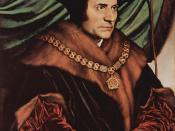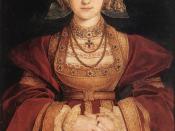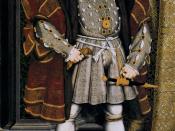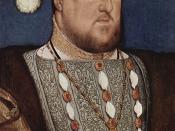Shakespeare is thought to have written Hamlet in 1600-01, it is thought to be one of his greatest plays and the most successful whilst he was alive. ÃÂRichard Burbage was almost certainly the first Hamlet and many allusions to the play vouch for its contemporary successÃÂ (Wells, 68). It is based on a lost play known as the Ur-Hamlet. This play can be seen to be very personal to Shakespeare as it was written one year after ShakespeareÃÂs own fatherÃÂs death. Also the main character, Hamlet has the same name as ShakespeareÃÂs own son who had died five years previously. Another reason as to why Hamlet is so interesting to read or to go see performed on the stage is because of the cultural influences on the play, more specifically the Reformation.
Some contextual background to Hamlet which Shakespeare does draw upon in the play is the English Reformation which came about due to a political argument between King Henry VIII and the Pope, the Head of the Roman Catholic Church.
Henry claimed that this lack of a male heir was because his marriage was "blighted in the eyes of God" (www.the-tudors.org.uk/king-henry-viii-quotes.htm). Catherine had been his late brother's wife, and it was therefore against Biblical tradition for Henry to have married her (Leviticus 20:21); a special dispensation from Pope Julius II had been required to allow the wedding to take place. Henry disputed that this had been wrong and that his marriage had never been legally binding. In 1527 Henry asked Pope Clement VII to annul the marriage, but the Pope rejected HenryÃÂs requests. According to Canon Law the Pope cannot annul a marriage on the basis of a canonical impediment formerly bestowed. Henry only wished to have his marriage annulled in order to be allowed to marry Anne Boleyn. Thus Henry rejected the Catholic tradition and created The Church of England also known as Protestantism. This allowed Henry to divorce his wife Catherine and re-marry his second wife, Anne Boleyn.
This idea of marrying your brotherÃÂs wife is played upon by Shakespeare in the play. The idea of incest runs throughout the play and is frequently insinuated in the story by Hamlet and the ghost, most obviously in dialogue about Gertrude and Claudius, the former brother-in-law and sister-in-law who are married within two months of King HamletÃÂs death. From the very first scene in which Hamlet appears he shows exactly how he feels about the quick re-marriage of his mother to his uncle. He shows his displeasure through the double meaning of the word ÃÂsonÃÂ (Hamlet, I.II.67). Hamlet also mocks his mothers wedding later on in the same scene with Horatio.
ÃÂThrift, thrift, Horatio, the funeral baked meatsDid coldly furnish forth the marriage tables.ÃÂ (Hamlet, I.II.179-180).
The entire audience would have been able to make the connection between the story of GertrudeÃÂs remarriage and King Henry VIIIÃÂs marriage to Catherine of Aragon. This would have been a risky thing to do as Elizabeth I was on the throne, HenryÃÂs daughter. If she had disapproved of this mockery then the playwright could have been put into the Tower of London. During this era it was thought that the monarch was appointed by God this theory was also known as the Divine Right of Kings.
The theory of the Divine Right of Kings was ShakespeareÃÂs ÃÂofficial belief in respect of English politicsÃÂ (Wain, 24). This theory held that, since church and state were affiliated together, and the coronation service was a sacrament, therefore an anointed king could not be opposed except at the expense of mortal sin. Even though ShakespeareÃÂs official belief was in divine right he has avowed his belief in vigorous language throughout his work. But here is the complexity of it all as he is also the only one to scorn it the idea of divine kingship with such a fierce irony. His work is full of unforgettable statements of the belief in the divinity of kingship. But these statements tend to be made by men who have no right, in the sight of God or man, to be making them. For example, in Act 4 Scene 5 Claudius faces HamletÃÂs excited violence with a calm response:ÃÂLet him go, Gertrude; do not fear our person:There's such divinity doth hedge a king,That treason can but peep to what it would,Acts little of his will.ÃÂ (Hamlet, IV.V.123-126).
Yet Claudius is a murderer and usurper, who started the whole chain of evil which finally cost both Hamlet and his own their lives. This Divine Right of Kings caused problems for Hamlet as it could be seen that Claudius was appointed by God to be King. The very fact that he was on the throne meant he was under this line of kingship. Thus if Hamlet killed Claudius he would be going against GodÃÂs will. And would be committing a mortal sin.
Another mortal sin which is debated in the play is the idea of suicide. Two characters contemplate suicide and one of them actually sees it through. Hamlet considers suicide in the soliloquy in Act 1 scene 2. The thought of suicide actually physically torments him throughout the play:ÃÂO that this too too sallied flesh would melt,Thaw, and resolve itself into a dew,Or that the Everlasting had not fixedHis canon ÃÂgainst self-slaughter! O God, O God,How weary, stale, flat, and unprofitableSeem to me all the uses of this world!ÃÂ (Hamlet, I.II.129-143).
Suicide is a grave sin and is against the natural and revealed law of God. Suicide offends against the divine principle "You shall not kill." Taken from the Old Testament in which the Ten Commandments are set out in the books of Exodus and Deuteronomy. In the sixth century Common Era, suicide became a religious sin and a secular crime. In 533, those who committed suicide were accused of a crime and were denied a Christian burial, which was a requirement to enable the person to go to heaven. However, this is contradicted within Hamlet as it is suggested that Ophelia commits suicide by drowning herself.
ÃÂIs she to be buried in Christian burial,When she wilfully seeks her own salvation?ÃÂ (Hamlet, V.I.1-2).
In Act 5 Scene 1 the two gravediggers argue over why Ophelia is having a Christian burial. And they come to the conclusion it was because she was a ÃÂgentlewomanÃÂ (Hamlet, V.I.24). By this they simply mean that she has money and can buy a Christian burial from the church despite the fact that she committed suicide. However, the only difference to normal burials for people who did not commit suicide was that she was buried at night. People who did commit suicide altered their afterlife dramatically by their actions as they either went to hell or in the Catholic tradition they would spend a certain amount of weeks, months, or years in purgatory depending on the amount of sins they committed on Earth.
The afterlife is discussed by Shakespeare in great detail in this play. The concept of the ghost would not have been lost on its early seventeenth century audience. The apparition of HamletÃÂs only just deceased father. ÃÂThe ghostÃÂ, who declares to have been murdered by Claudius, calls upon Hamlet to take vengeance for his death. Nevertheless, it is not entirely certain whether the ghost is what it seems to be, or whether it is something else. Hamlet contemplates that the ghost might be a devil sent to trick him and tempt him into murder, and the question of what the ghost is or where it comes from is never definitively settled upon in the play. The idea of the devil coming into this world as a spirit sent to trick people in order to lead them into hell was a common idea in the sixteenth century. This idea was examined in Christopher MarloweÃÂs popular play Doctor Faustus. In which the Devil comes to earth and tricks Faustus into making a pact with him and turning his back on God.
England at this time was a religious commonwealth in which the church and state ruled the lands. This makes Hamlet an interesting play as it questions in an obscure way the Divine Rights of Kings and also the rulings of the church. This may be the reason as to why Hamlet is set in a foreign land and not England. Therefore in conclusion religion is key part in the story of Hamlet as it is integrated and entwined within the major plots and themes. The sixteenth and seventeenth audience whom Shakespeare was writing for would have understood the cultural references which Shakespeare draws upon in his plays. The idea of the devil coming to Earth to entice mankind into a life of sin was a popular belief and one which would have been preached in the churches to prevent people from sinning. Another fatal sin was the idea of committing suicide. Which the character Hamlet contemplates and Ophelia actually succeeds in doing. This raises the issue of whether Christians will go to Heaven if they do sacrifice their own lives as it goes against the Ten Commandments in the Old Testament. Shakespeare also draws upon contextual influences from King Henry VIIIÃÂs rule which had ended just fifty years previous to the first performance of Hamlet. He draws from HenryÃÂs marriage to his dead brotherÃÂs wife, Catherine of Aragon. Shakespeare then questions this the same way in which Henry did by getting the characters of Hamlet and the ghost to insinuate that it is in fact incest. Shakespeare uses religion to add depth and meaning to the play Hamlet. Even though it is of the revenge tragedy genre it has deep political roots in it which could have been seen as heretic in the day.
BibliographyKing Henry VIII Quotes. (2005, July 20th). Retrieved February 20th, 2008, from the-tudors.org: http://www.the-tudors.org.uk/king-henry-viii-quotes.htmHattaway, Michael. (2005). Renaissance & Reformations. Oxford: Blackwell Publishing.
Knight, G. Wilson. (1967). Shakespeare & Religion. London: Routledge & Kegan Paul.
Shakespeare, William. (2006). Hamlet (ed. Thomson and Taylor). London: Arden.
Glynne, Wickham. (1969). ShakespeareÃÂs Dramatic Heritage. London: Routledge and Kegan Paul.
Wain, J. (1964). The Living World of Shakespeare. London: Macmillan & Co.
Wells, S. (2005). Oxford Dictionary of Shakespeare. Oxford: Oxford University press.





